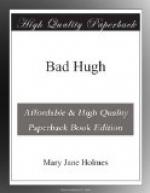“Must I die?”
“We hope not. We’ll do what we can to save you. Don’t think of dying, my boy,” was the physician’s reply, as he turned to Aunt Eunice, and gave out the medicine, which must be most carefully administered.
Too much agitated to know just what he said, Aunt Eunice listened, as one who heard not, noticing which, the doctor said:
“You are not the right one to take these directions. Is there nobody here less nervous than yourself? Who was that young lady standing by the door when I came in? The one in white, I mean, with such a quantity of curls?”
“Miss Johnson—our visitor. She can’t do anything,” Aunt Eunice replied, trying to compose herself enough to know what she was doing.
But the doctor thought differently. Something of a physiognomist, he had been struck with the expression of Alice’s face, and felt sure that she would be more efficient aid than Aunt Eunice herself. “I’ll speak to her,” he said, stepping to the hall. But Alice was gone. She had stood by the sickroom door long enough to hear Hugh’s impassioned words concerning his probable death—long enough to hear him ask that she might pray for him; and then she stole away to where no ear, save that of God, could hear the earnest prayer that Hugh Worthington might live—or that dying, there might be given him a space in which to grasp the faith, without which the grave is dark indeed.
Meantime, the Hugh for whom the prayer was made had fallen into a heavy sleep, and Aunt Eunice noiselessly left the room, meeting in the hall with Alice, who asked permission to go in and sit by him at least until he awoke. Aunt Eunice consented, and with noiseless footsteps Alice advanced into the darkened room, and after standing still for a moment to assure herself that Hugh was really sleeping, stole softly to his bedside and bent down to look at him, starting quickly at the strong resemblance to somebody seen before. Who was it? Where was it? she asked herself, her brain a labyrinth of bewilderment as she tried in vain to recall the time or place where a face like this reposing upon the pillow before her had met her view. Suddenly she remembered Irving Stanley, and that between him and Hugh there was a relationship, and then she knew it was the likeness to Irving Stanley, which she so plainly traced. Alice hardly cared to acknowledge it, but as she looked at Hugh she felt that his was really the handsomer, the more attractive face of the two. It certainly was, as he lay there asleep, his long eyelashes resting upon his flushed cheek, his dark hair curling in soft rings about his high, white brow, his rich, brown beard glistening with perspiration, and his lips slightly apart, showing a row of even teeth.
There were others than Alice praying for Hugh that summer afternoon, for Muggins had gone from the brook to the cornfield, startling Adah with the story of Hugh’s sickness, and then launching out into a glowing description of the new miss, “with her white gown and curls as long as Rocket’s tail.”




